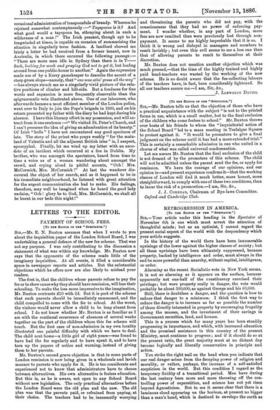LETTERS TO THE EDITOR.
PAYMENT OF SCHOOL FEES.
(To THE EDITOR Or TEl " SPECTATOR:1
SIR,—Mr. E. N. Buxton assumes that when I wrote to you about the inquisition paper of the London School Board, I was undertaking a general defence of the new fee scheme. That was not my purpose. I was only contributing to the discussion a statement of what was within my knowledge. Mr. Buxton now says that the opponents of the scheme made little of the imaginary inquisition. At all events, it filled a considerable space in newspaper reports and articles. But the substantial objections which he offers now are also likely to mislead your readers.
The first is, that the children whose parents refuse to pay the fee or to show cause why they should have remission, will lose their schooling. To make the loss more impressive to the imagination, Mr. Buxton contrasts £20 with 2d. But it is part of the scheme that such parents should be immediately summoned, and the child compelled to come with the fee to school. At the worst, the visitors would never allow a child to be long absent from school. I do not know whether Mr. Buxton is as familiar as I am with the continual recurrence of absences of several weeks together on the part of the children whom this fee scheme will touch. But the first case of non-admission in my own locality illustrated one painful difficulty with which we have to deal. The child sent home—a little girl of eight years—was found to have had the fee regularly and to have spent it, and to have torn up the papers of notice and warning, instead of giving them to her parents.
Mr. Buxton's second grave objection is that in some parts of London remission is now being given in a wholesale and lavish manner to parents who apply for it. He is too considerate and experienced not to know that administrators have to choose between alternatives. His own alternative is feeless education. But this is, as he is aware, not open to any School Board without new legislation. The only practical alternatives before the London Board were the old plan and the new. The old plan was that the parents paid, or refrained from paying, at their choice. The teachers had to be incessantly worrying and threatening the parents who did not pay, with the consciousness that they had no power of enforcing pay- ment. I wonder whether, in any part of London, more fees are now remitted than were previously lost through non- payment. It seems to me highly improbable that it is so. I think it is wrong and disloyal in managers and members to remit lavishly ; but even this evil seems to me a less one than that of allowing parents to remit to themselves at their discretion.
Mr. Buxton does not mention another objection which was much pressed,—that the time of the highly trained and highly paid head-teachers was wasted by the working of the new scheme. He is no doubt aware that the fee-collecting labours of the teachers have, in fact, been considerably lightened. So all our teachers assure me.—I am, Sir, &c., J. LLEWELYN DAVIES.


































 Previous page
Previous page